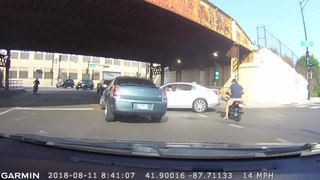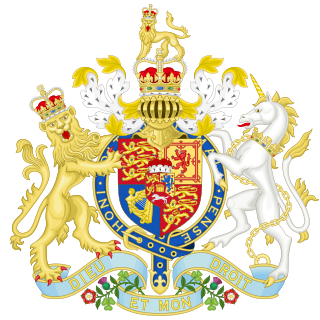The Witchcraft Acts were historically a succession of governing laws in England, Scotland, Wales, Ireland, and the British colonies on penalties for the practice, or—in later years—rather for pretending to practise witchcraft.

A stagecoach is a four-wheeled public transport coach used to carry paying passengers and light packages on journeys long enough to need a change of horses. It is strongly sprung and generally drawn by four horses although some versions are drawn by six horses.

Driving under the influence (DUI) is the offense of driving, operating, or being in control of a vehicle while impaired by alcohol or drugs, to a level that renders the driver incapable of operating a motor vehicle safely. Multiple other terms are used for the offense in various jurisdictions.
Vehicle insurance is insurance for cars, trucks, motorcycles, and other road vehicles. Its primary use is to provide financial protection against physical damage or bodily injury resulting from traffic collisions and against liability that could also arise from incidents in a vehicle. Vehicle insurance may additionally offer financial protection against theft of the vehicle, and against damage to the vehicle sustained from events other than traffic collisions, such as keying, weather or natural disasters, and damage sustained by colliding with stationary objects. The specific terms of vehicle insurance vary with legal regulations in each region.
Vehicular homicide is a crime that involves the death of a person other than the driver as a result of either criminally negligent or murderous operation of a motor vehicle.

Road rage is aggressive or angry behavior exhibited by the drivers of vehicles. These behaviors include rude and verbal insults, yelling, physical threats or dangerous driving methods targeted at other drivers, pedestrians or cyclists in an effort to intimidate or release frustration. Road rage can lead to altercations, damage to property, assaults, and collisions that result in serious physical injuries or even death. Strategies include cutting motorists off, inappropriate honking, using obscene gestures, flipping off another driver, swerving, tailgating, brake checking, and attempting to fight.

A traffic ticket is a notice issued by a law enforcement official to a motorist or other road user, indicating that the user has violated traffic laws. Traffic tickets generally come in two forms, citing a moving violation, such as exceeding the speed limit, or a non-moving violation, such as a parking violation, with the ticket also being referred to as a parking citation, or parking ticket.

An Act to prevent the further Growth of Popery was an Act of the Parliament of Ireland that was passed in 1704 designed to suppress Roman Catholicism in Ireland ("Popery"). William Edward Hartpole Lecky called it the most notorious of the Irish Penal Laws.
Many countries have adopted a penalty point or demerit point system under which a person’s driving license is revoked or suspended based on the number of points they’ve accumulated over a specific period of time, points are given for traffic offenses or infringements committed by them in that period. The demerit points schemes of each jurisdiction varies. These demerit schemes are usually in addition to fines or other penalties which may be imposed for a particular offence or infringement, or after a prescribed number of points have been accumulated.

A parking violation is the act of parking a motor vehicle in a restricted place or in an unauthorized manner. It is against the law virtually everywhere to park a vehicle in the middle of a highway or road; parking on one or both sides of a road, however, is commonly permitted. However, restrictions apply to such parking, and may result in an offense being committed. Such offenses are usually cited by a police officer or other government official in the form of a traffic ticket.

In United States law, reckless driving is a major moving violation related to aggressive driving that generally consists of driving a vehicle with willful or wanton disregard for the safety of persons or property. It is usually a more serious offense than careless driving, improper driving, or driving without due care and attention, and is often punishable by fines, imprisonment, or the suspension or revocation of one's driver's license. In Commonwealth countries, the offense of dangerous driving applies.

Criminal damage in English law was originally a common law offence. The offence was largely concerned with the protection of dwellings and the food supply, and few sanctions were imposed for damaging personal property. Liability was originally restricted to the payment of damages by way of compensation.

The Stage Coaches Act 1790 was an Act of Parliament of the Parliament of Great Britain to regulate the use of stagecoaches.

The Madhouses Act 1774 was an Act of the Parliament of Great Britain, which set out a legal framework for regulating "madhouses".
Impaired driving is the term used in Canada to describe the criminal offence of operating, having care or the control of a motor vehicle while the person's ability to operate the motor vehicle is impaired by alcohol or a drug. Impaired driving is punishable under multiple offences in the Criminal Code, with greater penalties depending on the harm caused by the impaired driving. It can also result in various types of driver's licence suspensions.
The laws of driving under the influence vary between countries. One difference is the acceptable limit of blood alcohol content before a person is charged with a crime.

In traffic laws, a hit and run or a hit-and-run is the criminal act of causing a traffic collision and not stopping afterwards. It is considered a supplemental crime in most jurisdictions.

The Protection of Stocking Frames, etc. Act 1788 was an Act of Parliament passed by the British Government in 1788 and aimed at increasing the penalties for the deliberate disruption of the activity of mechanical knitting machines.

Drug-impaired driving, in the context of its legal definition, is the act of driving a motor vehicle while under the influence of an impairing substance. DUID, or Driving Under the Influence of Drugs, is prohibited in many countries. Several American states and European countries now have "per se" DUID laws that presume a driver is impaired if they are found to have any detectable quantity of controlled substances in their body while operating an automobile and that the driver has no doctor's prescription for the substance. This is similar to the "per se" DUI/DWI laws that presume a driver is impaired when their blood alcohol content is above a certain level. There is some controversy with "per se" DUID laws in that a driver with any detectable quantity of controlled substances may not in fact be impaired and the detectable quantity in blood or sweat may be only the remnants of drug use in days or weeks past. It is against road traffic safety. Research on factors associated with engaging in DUID is receiving increasing attention to develop more effective countermeasures.

The Plantation Act 1740 or the Naturalization Act 1740 are common names used for an act of the British Parliament that was officially titled An Act for Naturalizing such foreign Protestants and others therein mentioned, as are settled or shall settle in any of His Majesty's Colonies in America.












